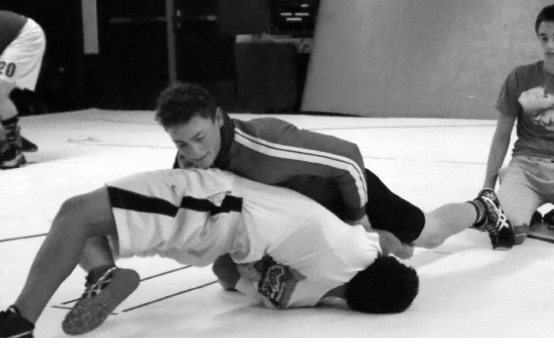Weighty issues for athletes and diets

Senior Ben Hofmann, practicing his pinning, keeps a close watch on his wresting weight.
Steven Scoville remembers a time when wrestlers would use extreme diets to lose 20 to 30 pounds
before a season. Wrestlers tried anything from starving themselves to wrapping plastic bags over their limbs
to help them sweat-off water weight.
“We don’t like to talk about dieting, necessarily. We talk about eating healthfully and in particular
hydration,” says Scoville, coach of the Lincoln’s co-ed wrestling team.
When it comes to dieting, the requirements are little to none. Instead, the team focuses on something
Scoville calls the four Cs: character, class, courage and commitment.
But in the world of competitive sports, even athletes at the high school level strive to maximize their
competitive edge. Food provides energy. The right food in the right amount helps an athlete prime his body.
In some sports like wrestling, rowing or gymnastics, the addition or subtraction of a couple pounds can
throw off that balance.
Wrestling comes with another complication. An extra pound can mean wrestling in a different weight
class. So many wrestlers try to eat conscientiously.
“You definitely have to be aware of what you’re eating and how much you’re eating. We’re not starving
ourselves,” says senior wrestler Gage Halverson. It does help wrestlers if they can be the top of their weight
class, but cutting nutrients can affect performance on the mat.
“It’s relatively easy to lose weight, but you’re doing that at the expense of important parts of your body,
especially your brain and other metabolically active parts of your body,” says Ben Hoffman, a pediatrician at
Doernbecher Children’s Hospital in Portland. When athletes drastically cut calories, they sacrifice the quality
of their performance and, more importantly, risk long-term effects on health.
To eliminate extreme diets, the wrestling community has turned to a program called the Optimum Performance
Calculator. It considers a wrestler’s weight and body composition, and calculates how much weight the wrestler
can safely lose in one season. That determines the lowest weight class in which a wrestler can compete.
“We talk about food being a fuel and without that fuel, they’re not going to be able to perform well,” says
Scoville.
Although the adoption of the performance calculator may have mostly eliminated starvation dieting,
health care providers view it with some skepticism.
“Nobody has really looked at what those sort of estimates mean in terms of long-term performance,” Hoffman
says. No one knows how these calculations could affect a teenager when he or she is 50, for example, he adds.
Nutrition plays a crucial role in all sports. Along with wrestling, gymnastics and rowing are just two other
sports where athletes carefully balance weight.
Gymnasts strive to eat complex carbs and nutritious foods that they are comfortable with.
“Before meets I usually tend to eat foods that have complex carbs such as pasta to give me energy the
night before,” says freshman gymnast Madison Fassiotto. Without these crucial nutrients, performance can
suffer.
For rowers, what they eat before a regatta is less regimented. But they still have to focus on eating
healthfully.
“Nutrition plays a moderately large role in my life. I don’t go out of my way to count calories and such, but
I definitely try to eat healthy,” says junior Sammy Gold.
Sometimes it’s as simple as athletes just don’t want to let the team down. If a wrestler is expected to be a
certain weight, there can be self-imposed pressure to meet it.
“The day of a meet it really depends on how my weight is that day,” says senior Ben Hofmann. “On a
good day, I’ll be underweight by a few pounds and I can eat a salad or a small sandwich.” If he is under by
less than a pound then he will probably not eat, he says, until after he wrestles.
But many coaches in all sports steer athletes away from extreme measures. Doctors echo the same
message.
“Taking a kid who is supposed to be 120 pounds and trying to make them 110 pounds is probably
going to injure that kid in some way,” says Hoffman. “Maybe not visibly in the short term, but probably in the
long term.”
